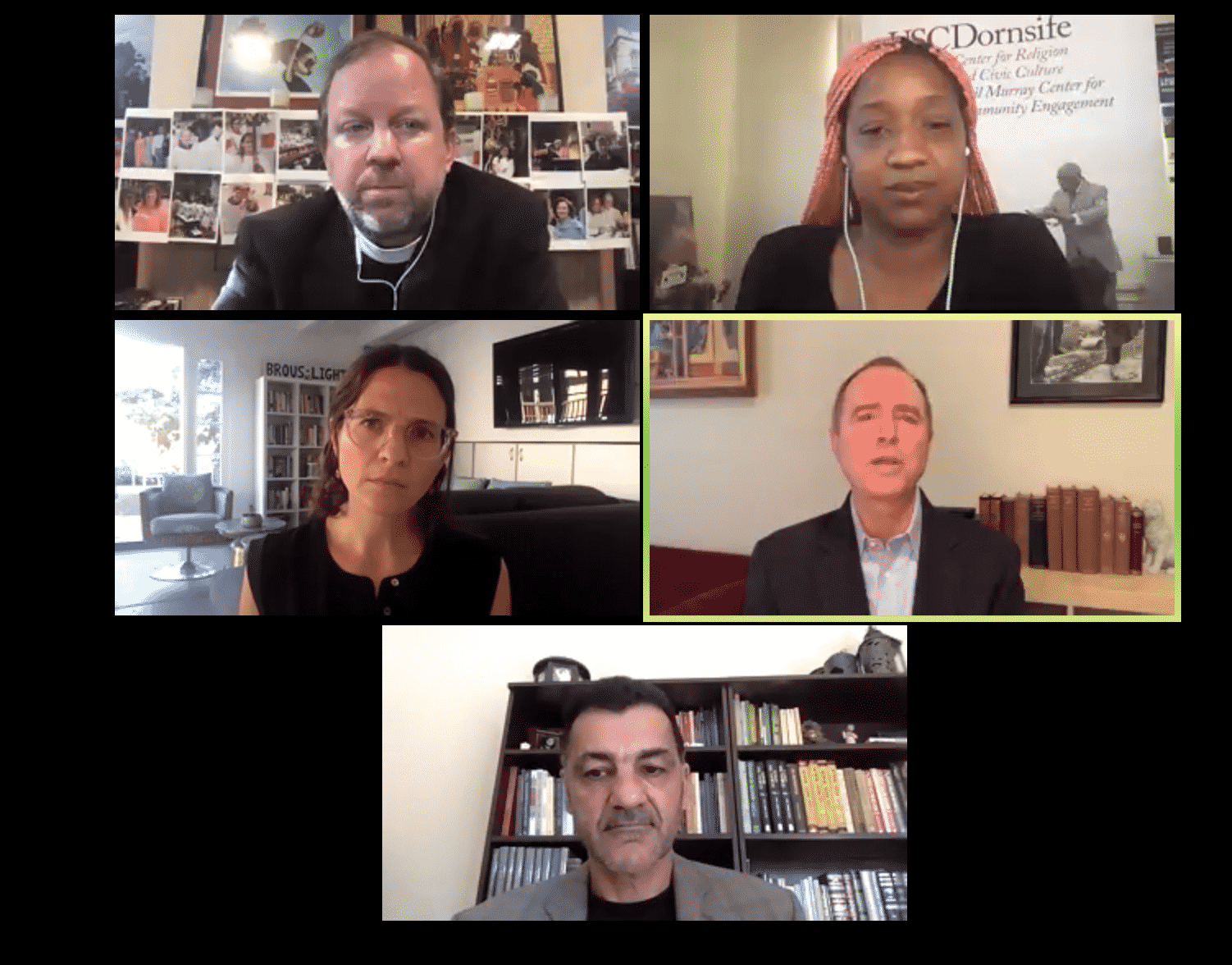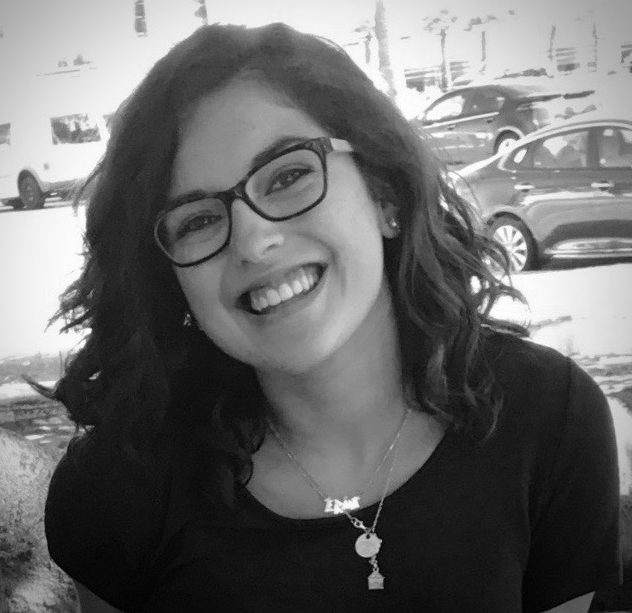 From left down: Rev. Mike Kinman, Rev. Dr. Najuma Smither-Pollard, Rabbi Sharon Brous, Rep. Adam Schiff and Salam Al Marayati. Photograb from Zoom/Erin Ben-Moche
From left down: Rev. Mike Kinman, Rev. Dr. Najuma Smither-Pollard, Rabbi Sharon Brous, Rep. Adam Schiff and Salam Al Marayati. Photograb from Zoom/Erin Ben-Moche
With Americans facing a historic health and economic crisis, racial inequality and a presidential election, California spiritual leaders joined a Zoom town hall June 9 with Rep. Adam Schiff (D-Burbank) to break down the “quadruple-threat crises” impacting millions.
Moderated by Rev. Najuma Smith-Pollard, program manager at the Cecil Murray Center for Community Engagement at USC, the interfaith clergy comprised Pasadena’s All Saints Church Rev. Mike Kinman, IKAR Senior Rabbi Sharon Brous and Salam Al-Marayati from the Muslim Public Affairs Council. To date, the event has been viewed more than 6,300 times.
“We’re in a crisis upon a crisis upon a crisis right now,” Brous said. “I do believe that in this time … it’s really a triple-threat of crises right now, that we have an incredible opportunity. I see in this moment the birth of a multiracial democracy. As much as my heart is aching right now, I really feel that something is different in this moment and that something incredibly powerful is born.”
In the wake of the protests sparked by the death of George Floyd and other black people who have died at the hands of police, protesters have ignited a movement aimed at defunding police departments around the country by distributing police funds to other essential community programs. During the call, Schiff spoke about the Justice and Policing Act of 2020. The act, unveiled June 8 by Democratic congressmembers, was initiated under the leadership of Congressional Black Caucus Chair Karen Bass (D-Los Angeles); Rep. Jerrold Nadler (D-N.Y.), who chairs the Judiciary Committee; and Sens. Cory Booker (D-N.J.) and Kamala Harris (D-Calif.).
Schiff also discussed the reforms outlined in the act, including strengthening the civil rights division in the justice department, tracking police misconduct, outlawing tactics such as chokeholds, curbing the use of no-knock warrants in drug-related cases and reforming qualified immunity for police officers. (Qualified immunity makes it difficult for police officers to be held accountable for any wrongdoing while on the job.)
“I think for most of us in Congress, what we are supporting is … how our policing dollars are going to be used, how our community dollars are going to be used,” Schiff said. “Divesting resources from a militarized police and more towards mental health services, substance abuse services and housing services and economic resources, essentially reducing the need for police …”
He added that shifting resources should be the goal so that communities aren’t spending a third or more of their local tax dollars on police but instead on helping people with housing, education, mental health and other needs.
Al-Marayati said budgets currently focus more on state security. “We need a budget that reflects human security as a part of national security,” he said. Human security, he explained, means health security, economic security, housing security and racial equality — “when we talk about our inalienable rights: life, liberty and the pursuit of happiness. That’s real security,” he said.
Smith-Pollard noted that people are intimating that “this time is different. The energy is different. This particular movement has been coined ‘the largest civil rights movement in history.’ ” However, she asked Schiff if it would stick.
“I recognize the skepticism,” Schiff responded. “I believe this will be different. Perhaps one of the reasons why it may be different … is because this pandemic has given us a chance … to spend more time at home thinking about what is truly precious in life: our health, our families, our community.”
He added that he hoped this period of national imposed isolation produces positive results. From the outset of the pandemic, Schiff said, “We have to view this as an opportunity to build the country back together but build it back better.”
“I think for most of us in Congress, what we are supporting is … divesting resources from a militarized police and more towards mental health services, substance abuse services and housing services and economic resources, essentially reducing the need for police.” — Rep. Adam Schiff
Kinman said the way spiritual groups “build it back better” is through listening to the voices of people who abandoned religion because “they’ve seen it sell them out.” He referenced a speech by activist and writer Andre Henry, who argued that policing needs to have the same integrity as a popular pizza chain.
“What Domino’s [pizza] did was realize it was making crappy pizza and admitted it,” Kinman said, adding, as a result, Domino’s decided, “ ‘We’re not going to do this anymore. We’re going to change significantly,’ and then they did.”
He added that what is needed is “a reckoning and an understanding in this country that policing at its core has always broken a covenant with the American people and particularly people of color and particularly poor people.”
Brous, Kinman and Al-Marayati also touched on how they’ve been using this time to make their sacred spaces a welcoming place for the black people in their community — whether it’s facing racism from within, inviting them to share their experiences in a sermon, or encouraging black congregants to be involved in boards or programming.
Al-Marayati said, “We see a Euro-centric way of teaching our children. There’s no acknowledgment of the great contributions of so many other societies in world civilization. You go immediately from Greek to Roman and then to the European Renaissance. Nothing in between …. It has programmed us to think that the darker the race, the worse it is, and we have to rid ourselves of that original sin.”
Brous noted that in a recent Shabbat sermon, she spoke about white shame and how “shame paralyzes us and not mobilizes, [and] courageous leadership [is necessary in being the] most robust versions of ourselves.”
Schiff also spoke about how, despite Congress passing major coronavirus legislation to help expand and develop tracing and testing, clinical trials, funding for hospitals and health clinics, accelerated work on a vaccine and stimulus packages for Americans, some of his Republican colleagues think that their work is done.
“You hear statements from some of the Republican leadership like [Senate Majority Leader] Mitch McConnell saying, ‘Well, maybe we just let the states go bankrupt’ and ‘maybe we should stop unemployment compensation,’ ” Schiff said. “These are very radically different views than the ones that I hold and the majority of the Democratic Caucus, which means it’s going to be tougher now to get to ‘Yes’ and we still have a long way to go.”
He added that the pandemic has revealed a “shocking visibility [to] these tremendous disparities, inequities, [and] injustices in our society” including struggling minority-owned businesses, health risks within black and Latino communities and educational divides for students who can’t access technology for home schooling.
“We need to address those disparities right now with real urgency,” he said.
Kinman said, “People say, ‘Well, we’re all in the same boat.’ No, we’re not. We’re all in the same storm, we have very, very different boats. But what we have got to do is tie the boats together.”
When Smith-Pollard asked Schiff if he was committed to fixing these disparities, Schiff replied, “Absolutely. Reverend, you had me at hello .… I will take the risk of quoting from the Bible … a passage that really has guided my work … ‘What is required of us but to do justice, to love mercy and walk humbly with thy God.’ ”
To watch the discussion in its entirety click here.























 More news and opinions than at a Shabbat dinner, right in your inbox.
More news and opinions than at a Shabbat dinner, right in your inbox.